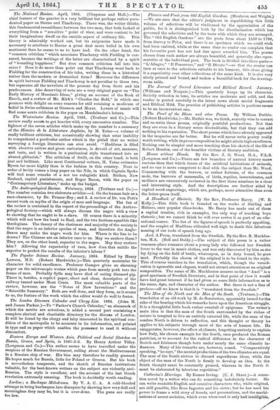sake of the bearing which his remarks have upon the
American struggle.
It is a thoughtful little book rather overfull of epigrams. The writer's main idea is that the man of the South surrounded by the riches of nature is tempted to live an entirely external life, while the man of the sombre North is driven to reflection, and this thought or theory he applies to his subjects through most of the acts of human life. He exaggerates, however, the effect of climate, forgetting entirely to explain how Italy, his chosen example for the South, once produced the Roman patrician, or to account for the radical difference in the character of Scotch and Irishmen though born under nearly the same climatic in- fluences. Many of his remarks aro, however, sound. " Comparatively speaking, "he says," the mental productions of the two climates are equal.
The man of the South strives to discard superfluous ideas, while the object of the man of the North is firmly to develop an idea. In the South thought must be constantly pruned, whereas in the North it must be elaborated by laborious repetition."






























 Previous page
Previous page